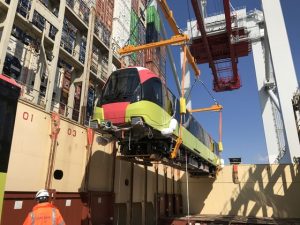 The second of the ten 4 – car trains for Hanoi metro Line 3 has been shipped by Alstom from Valenciennes plant. The new metro train will arrive in January 2021.
The second of the ten 4 – car trains for Hanoi metro Line 3 has been shipped by Alstom from Valenciennes plant. The new metro train will arrive in January 2021.
The other eight metro trains will all be delivered to Hanoi in time for the start of commercial service, which is scheduled for 2021.
The delivery of the vehicles requires one of the most complex logistics operations that were put in place by Alstom’s Exceptional Transport department which is responsible for managing and purchasing the train deliveries.
More than a year’s preparation was necessary to organise these deliveries. Defining the most suitable transport solution, designing and manufacturing specific handling tools and obtaining authorisations in France and Vietnam were some of the key stages of this transport operation. This is a real team effort between the Valenciennes site, the Alstom teams in Vietnam, and the many subcontractors involved in this project, most of whom are French.
The delivery of the metro to its final destination requires six lifting operations per car, each one weighing between 34 and 40 tonnes, and a transit time of two months.
At the Valenciennes site, after separation and preparation of the four cars, which are approximately 20 metres long, they are loaded onto extendable trailers using cranes to transport them to the port of Dunkirk, located just over one hundred kilometres away. Thanks to its partners and subcontractors, including the company Geodis and the dock workers of the port of Dunkirk, the 4 cars are then loaded by lifting them more than 40m high aboard a container ship belonging to the French shipping company CMA CGM.
After a crossing of just over a month between Dunkirk and Port Klang in Malaysia, the 4 cars will be unloaded and then transshipped on board a ship bound for the port of Haiphong in Vietnam. The last leg of the journey to the depot in Hanoi will take about ten more days.
Alstom won the contract to supply an integrated metro system for Hanoi metro Line 3 in 2017. Alstom is responsible for the design and manufacture of the 10 trains, the supply and integration of the Urbalis 400 signalling system, the power supply and the depot equipment.
This new line, which will provide Hanoi’s residents with a new, safe and environmentally friendly means of transport, involves several French companies – Alstom, Colas Rail, Thales, and is financed by the French Ministry of Economy and Finance and Directorate General of the Treasury, the French Development Agency, the European Investment Bank and the Asian Development Bank.
The new line will extend over 12.5 km and will consist of 12 stations. The line is expected to transport more than 23,900 passengers per hour in each direction.
Share on:



